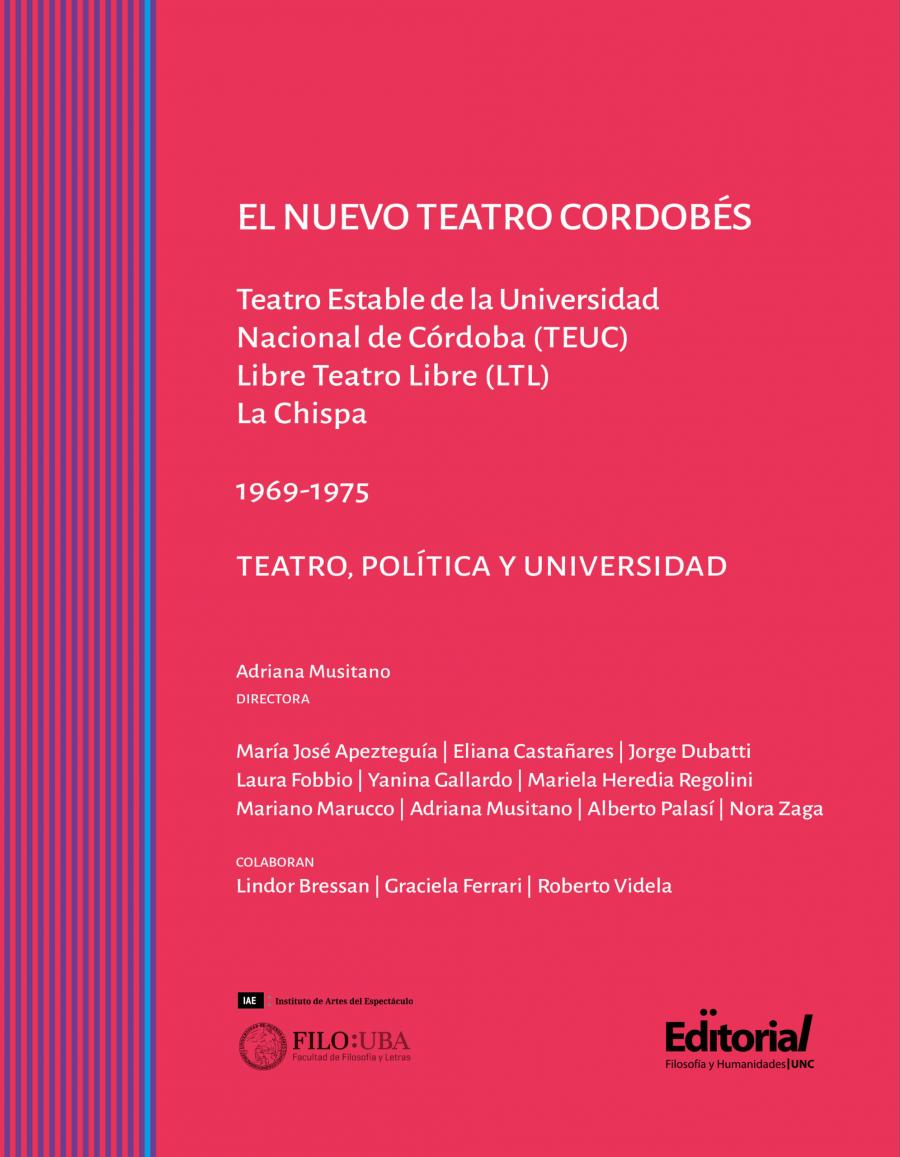The new theater in Cordoba: Permanent Theater of the National University of Córdoba (TEUC). Free Theater (LTL). La Chispa. 1969-1975. Theater, Politics, and University
Keywords:
Argentine theater, Cordoba theater - 20th century, independent theater, Cordoba (Argentina) - 1969-1975, theatrical production, political theater, culture, cultural movements, military dictatorship - influence on culture, artistic expression, Argentine dramaturgy, theater and society, Permanent Theater of the National University of Córdoba (TEUC), Free Theater Group (LTL), Group La ChispaSynopsis
This is one of three digital books produced by the Faculty of Philosophy and Humanities and the Institute of Performing Arts at the University of Buenos Aires (UBA) as part of the research project “Theater, Politics, and University: Córdoba, 1965-1975.”
The three books are being published jointly by the Faculty of Philosophy and Humanities Press and the Institute of Performing Arts of the Faculty of Philosophy and Letters (UBA). As Jorge Dubatti points out in the prologue “Towards a Cartography of Argentine Theaters” of the book that begins the series, “these three volumes represent a fundamental contribution to the knowledge of Argentine theaters (in the plural) and to the construction of an increasingly complex and rich national theatrical cartography,” adding that “the research works brought together in the three volumes fulfill this condition of radical cartography, mapped thinking, and an invitation to dialogue on cartographies beyond Córdoba.”
The works were produced as part of the research project “Theater, Politics, and University: Córdoba, 1965-1975,” carried out between 1996 and 1999 at the Center for Advanced Studies, directed by Horacio Crespo and co-directed by Nora Zaga. The project was subsequently based, between 2000 and 2010, at the Research Center of the Faculty of Philosophy and Humanities (UNC), under the direction of Adriana Musitano and co-directed by Nora Zaga.
The publication of the three volumes was subsidized by the Secretariat of Science and Technology, National University of Córdoba, and endorsed by the Department of Theater of the Faculty of Arts (UNC), the Argentine Association of Theater Research and Criticism (AINCRIT), and the Latin American Network of Performing Arts Documentation Centers.
Chapters
-
Theater, politics, university. Experimental and emancipatory productions
-
The New Cordoba Theater, a media construction
-
1. Permanent Theater of the National University of Córdoba (TEUC)
-
The Permanent Theater of the National University of Córdoba (TEUC). 1969-1974
-
Interactions, dramatic conflict, and endless play in The Architect and the Emperor of Assyria (TEUC, 1970)
-
Theater, humor, and politics in Córdoba in the 1970s
-
Peace in the Clouds, appropriation and experimental venture by the University Theater of Córdoba
-
The theater opens the debate: The One Who Said Yes and The One Who Said No by Bertolt Brecht (TEUC, 1973)
-
Desiring vectors and symbolic configuration in productions by TEUC, 1970 and 1973
-
Productions by the Permanent Theater of the National University of Córdoba (TEUC). 1969-1973. Peace in the Clouds (Petraglia-Fraga, TEUC, 1971)
-
2. Free Theater Group (LTL)
-
The LTL, independent theater production, and revolutionary thought. 1966–1975
-
The staging of education, interaction, and two-dimensionality. Contratanto (LTL, 1972)
-
LTL, Something Like That (1974). Art and artists, humor, politics
-
Free Theater. My discovery of Something Like That
-
About Something Like That
-
The representation of space, LTL, and The End of the Road
-
Notes for The End of the RoadThe Face (LTL, 1976)
-
Small miracles
-
Performances by Libre Teatro Libre (1970–1977). Something like that. The end of the road.
-
3. La Chispa Group
-
Mao, a spark in the theater scene of Córdoba in the 1970s, Strike in the salt flats
-
La Chispa, theater and politics
-
Performances and works by La Chispa (1972-1976). Strike in the salt flats (Huelga en las Salinas). Tenancy, or living as best you can.

Downloads
Published
License

This work is licensed under a Creative Commons Attribution-NonCommercial-ShareAlike 4.0 International License.


